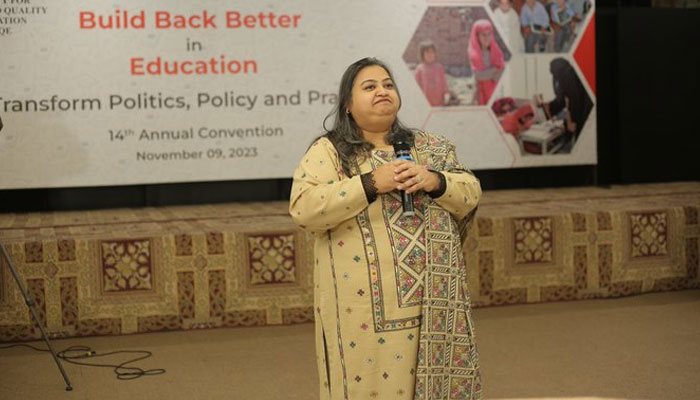Education revolution beckons as 25 to 28 million children in Pakistan face exclusion
Islamabad:In a resounding call for national reckoning, Zehra Arshad, the Executive Director of the Society for Access to Quality Education (SAQE) and National Coordinator of the Pakistan Coalition for Education (PCE), declared a state of emergency for education in Pakistan. With an estimated 25 to 28 million children currently out of school, Arshad asserted, "We, as a nation, no longer have the luxury to treat education with indifference and neglect that consequent governments have meted out in the past."
This stark revelation came at the heart of the 14th Annual Convention hosted by PCE, where civil society, youth, and academia joined forces to address the burgeoning crisis. The gathering culminated in the unveiling of the "Charter of Education," a comprehensive manifesto demanding immediate action to rectify the historical neglect towards education.
Arshad's impassioned plea serves as the rallying cry for a paradigm shift in Pakistan's approach to education. The Charter not only emphasizes the urgent need for political consensus but also calls for tangible commitments from political parties to tackle the colossal challenge. The document pushes for inclusivity, targeting marginalized groups such as girls, children with disabilities, and transgender students.
Beyond the sheer numbers, the Charter delves into the multifaceted issues plaguing the education system, including an underutilized youth bulge, alarmingly high learning poverty, and the impact of the pandemic, which has left a staggering 75% of students facing learning poverty.
The Charter doesn't stop at highlighting the problem; it presents a roadmap for change. Proposals include diverting disaster aid towards education, providing conditional cash transfers to affected households, and enhancing public investment in education. The call for collaboration spans ministries, involving not only the Ministry of Education but also the Ministry of Climate Change to create a resilient education system.
Moreover, the Charter champions the safety of educational institutions, demanding the implementation of existing laws to protect students from harm. It advocates for improved teacher training programs, a shift towards a one-teacher-one-classroom approach, and a curriculum revision to foster critical thinking and 21st-century skills.
As Pakistan stands at the precipice of an educational crisis, Arshad's words echo as a poignant reminder that the nation can no longer afford to turn a blind eye to the dire state of education. The Charter of Education serves as a beacon of hope, challenging the status quo and demanding a transformative commitment to secure a brighter future for the nation's children.
-
 Maxwell Seeks To Block Further Release Of Epstein Files, Calls Law ‘unconstitutional’
Maxwell Seeks To Block Further Release Of Epstein Files, Calls Law ‘unconstitutional’ -
 Prince William Issues 'ultimatum' To Queen Camilla As Monarchy Is In 'delicate Phase'
Prince William Issues 'ultimatum' To Queen Camilla As Monarchy Is In 'delicate Phase' -
 Winter Olympics 2026: Remembering The Most Unforgettable, Heartwarming Stories
Winter Olympics 2026: Remembering The Most Unforgettable, Heartwarming Stories -
 King Charles Hands All Of Andrew Mountbatten-Windsor’s Records And Files To Police: Report
King Charles Hands All Of Andrew Mountbatten-Windsor’s Records And Files To Police: Report -
 Eric Dane's Family Shares Heartbreaking Statement After His Death
Eric Dane's Family Shares Heartbreaking Statement After His Death -
 Samsung Brings Perplexity AI To Galaxy S26 With ‘Hey Plex’ Voice Command
Samsung Brings Perplexity AI To Galaxy S26 With ‘Hey Plex’ Voice Command -
 Fergie’s Spent £13,000 A Day Since Andrew’s Troubles Started: Here’s Where She Fled
Fergie’s Spent £13,000 A Day Since Andrew’s Troubles Started: Here’s Where She Fled -
 Eric Dane's Death Becomes Symbol Of ALS Awareness
Eric Dane's Death Becomes Symbol Of ALS Awareness -
 Michael B. Jordan Gives Credit To 'All My Children' For Shaping His Career: 'That Was My Education'
Michael B. Jordan Gives Credit To 'All My Children' For Shaping His Career: 'That Was My Education' -
 Sun Appears Spotless For First Time In Four Years, Scientists Report
Sun Appears Spotless For First Time In Four Years, Scientists Report -
 Bella Hadid Opens Up About 'invisible Illness'
Bella Hadid Opens Up About 'invisible Illness' -
 Lawyer Of Epstein Victims Speaks Out Directly To King Charles, Prince William, Kate Middleton
Lawyer Of Epstein Victims Speaks Out Directly To King Charles, Prince William, Kate Middleton -
 Microsoft CEO Shares How Gates Doubted $1bn OpenAI Investment
Microsoft CEO Shares How Gates Doubted $1bn OpenAI Investment -
 Milo Ventimiglia Calls Fatherhood 'pretty Wild Experience' As He Expects Second Baby With Wife Jarah Mariano
Milo Ventimiglia Calls Fatherhood 'pretty Wild Experience' As He Expects Second Baby With Wife Jarah Mariano -
 Chinese Scientists Unveil Advanced AI Model To Support Deep-space Exploration
Chinese Scientists Unveil Advanced AI Model To Support Deep-space Exploration -
 Anthropic’s New AI Tool Wipes Billions Off Cybersecurity Stocks
Anthropic’s New AI Tool Wipes Billions Off Cybersecurity Stocks




